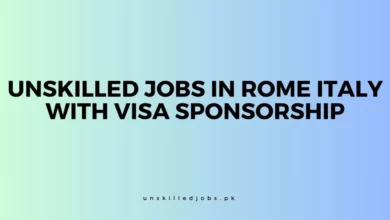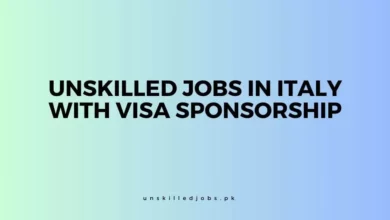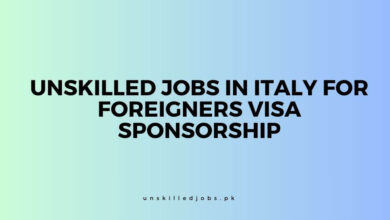Unskilled Jobs in Metropolitan With Visa Sponsorship 2024
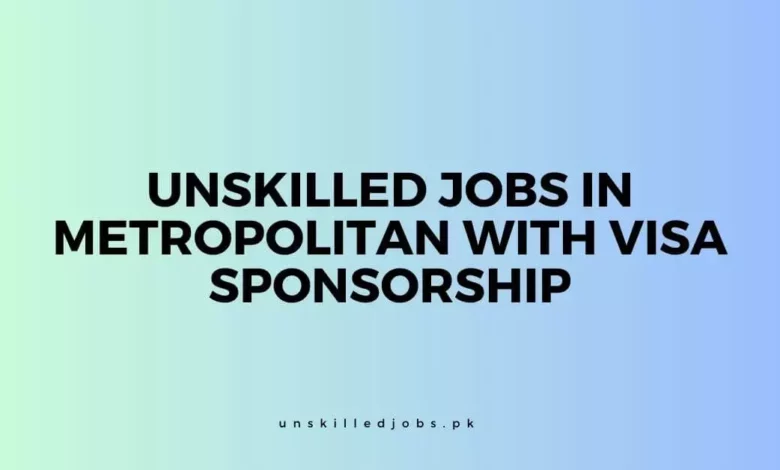
Discover Lucrative Unskilled Jobs in Metropolitan Areas with Visa Sponsorship—Your Path to Employment Opportunities Abroad. Explore Now
Are you ready to see new things and find low-skilled work in cities that will support your visa? This piece will go into detail about low-skilled jobs in busy cities and give you useful information on how to find them and negotiate the complicated process of getting a work visa.
Check Also: Unskilled Jobs in Wellington With Visa Sponsorship 2024
Understanding Unskilled Jobs
Jobs that don’t require special skills or a lot of training are called unskilled jobs. People with these jobs often do things like clean up after others, serve food, work on building sites, and more. They provide a way for people to find work even if they don’t have the right schooling or skills.
Need for Visa Sponsorship
In many cities, there aren’t enough workers in many businesses. To fill these positions, companies often look for skilled workers outside of their own country and pay for their visas. Visa sponsorship is very important because it lets people who are not citizens officially work in another country.
List of Unskilled Jobs in Metropolitan With Visa Sponsorship
If you want to work in a city without training and get your visa sponsored, you’ll be glad to know that there are many possibilities. These jobs are usually open to a wide range of people because they don’t require special skills or a lot of training. Here is a list of low-skilled jobs that can often be found in cities and can support visas:
- Construction Laborer: These workers assist in various construction tasks, such as digging, carrying materials, and site cleanup.
- Janitor or Cleaner: Janitors and cleaners maintain the cleanliness and hygiene of buildings, offices, and public spaces.
- Food Service Worker: This category includes roles like servers, kitchen staff, and dishwashers in restaurants, cafeterias, and fast-food chains.
- Farm Laborer: Those interested in agriculture may find opportunities in planting, harvesting, and farm maintenance.
- Retail Sales Associate: Many metropolitan areas have a thriving retail industry, offering positions in stores and supermarkets.
- Warehouse Worker: Warehouse workers handle the movement and storage of goods and products in distribution centers.
- Housekeeper: In the hospitality industry, housekeepers are responsible for maintaining the cleanliness of hotels and resorts.
- Security Guard: This role involves protecting properties, businesses, and individuals, often in a security or surveillance capacity.
- Landscaping and Groundskeeping: Workers in this category maintain outdoor spaces, gardens, and parks.
- Delivery Driver: Driving jobs, such as delivery drivers for courier services or food delivery apps, are often in demand.
- Childcare Worker: Some countries offer visa sponsorship for childcare workers, particularly in daycare centers and schools.
- Cleanroom Technician: In certain industrial settings, cleanroom technicians assist in maintaining sterile and controlled environments.
- House Painters: The construction and renovation industry often requires house painters to provide a fresh coat of paint.
- Caregiver for the Elderly: Positions for caring for elderly individuals in homes or facilities are available in some places.
- Gardener or Horticulturist: If you have a green thumb, you might find work in gardening and horticulture roles.
- Factory Worker: Factories in metropolitan areas often hire unskilled workers for tasks like assembly line work.
- Valet Parking Attendant: In the hospitality and event industry, valet parking attendants assist with parking services.
- Warehouse Packer: These workers focus on packaging products for shipment and distribution.
- Laundry Worker: Hotels and industrial laundries hire individuals to manage laundry and linen services.
- Custodian: Custodians are responsible for maintaining cleanliness and order in educational institutions, offices, and government buildings.
Benefits of Unskilled Jobs in Metropolitan
People looking for work in a foreign country can greatly benefit from low-skilled jobs in cities that can support their visas. There may not be any special skills or training needed for these jobs, but they can be the start of a better future. Here are some of the best reasons to look for low-skilled jobs in cities where visas are available:
- Legal Employment: Visa support lets people who are not citizens of the country where they want to work legally. This takes away the chance of working illegally and possibly getting in trouble with the law.
- Stable Income: A regular, stable income from unskilled work is often enough for people to support themselves and their families.
- Access to Healthcare: In many countries, untrained workers who are sponsored for visas can get medical care, which is good for their health and peace of mind.
- Social Services: Unskilled workers in cities may be able to use government-funded social services, like helping low-income families and giving kids an education.
- Career Growth: A lot of low-skilled jobs offer ways to move up in your work. If someone is dedicated and works hard, they can move up in their job and take on more skilled roles.
- Immigration Opportunities: Some types of visas let untrained workers start over in a new country by giving them a way to become permanent residents or even citizens.
- Diverse Work Environments: People who live and work in cities are exposed to a wide range of work settings, cultures, and people, which makes their lives more interesting.
- Learn New Skills: Getting low-skilled work can be a great way to learn new things and get experience in many areas.
- Global Exposure: Cities are often global hubs that let people learn about international trends, tools, and ways to network.
- Cultural Exchange: Unskilled workers can interact with people from different backgrounds, which helps people learn about and understand other cultures.
- Personal Growth: People who live and work in other countries have to change and adapt, which makes them stronger and more flexible.
- Support Networks: There are often established communities of expatriates and immigrant workers in metropolitan areas. These communities offer support and a feeling of belonging.
- Financial Savings: Skilled workers may be able to save some of their pay to send back to their home country or invest in the future, depending on the country and the exchange rate.
- Lifestyle Enhancement: People who live in cities usually have a higher standard of living because the facilities, entertainment, and quality of life are better.
- Networking Opportunities: When you live in a city, building a professional network can lead to many job possibilities and personal connections.
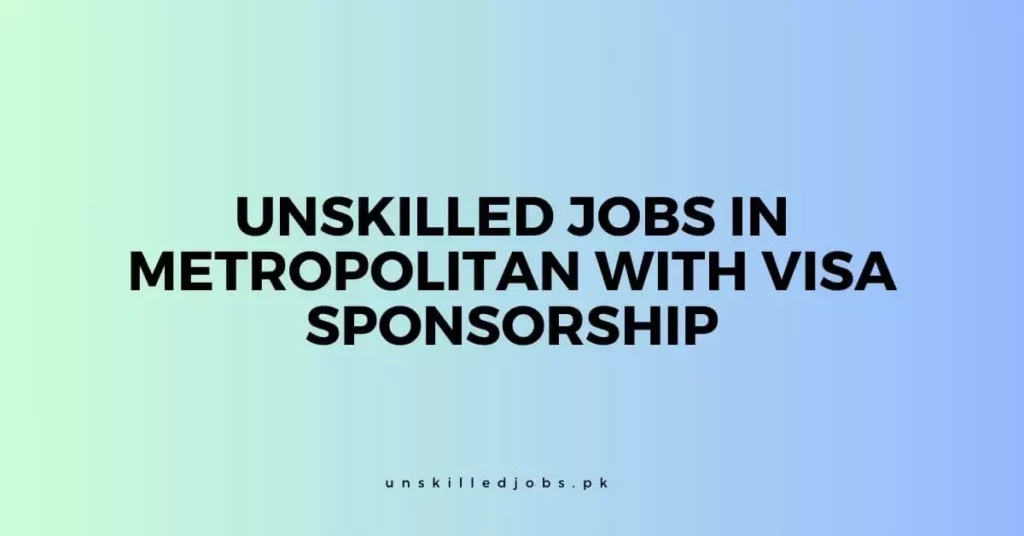
Finding Unskilled Jobs with Visa Sponsorship
People who want to get a visa-sponsored job that doesn’t require a lot of skills need to take the initiative. This part gives you advice on how to look for job openings, make a strong resume, and get in touch with possible companies.
Preparing for the Job Search
To get ready for a job search, you need to know your strengths, keep your skills up to date, and learn about possible employers. This part walks you through the process of getting ready.
Application Process of Unskilled Jobs in Metropolitan
You’ll need to send in an application once you’ve found a job opening. What are the most important parts of an application? How can you make yours stand out?
Interviews and Documentation
Interviews:
- Initial Screening: The first step is generally an interview for screening, which can be done over the phone or through a video call. During this interview, which is usually with a recruiter or HR person, they will look at your skills and see if you are a good fit for the job.
- In-Person or Video Interview: If you make it through the first round of screening, you’ll be asked to come in for a more in-depth interview, which could happen in person or over videoconferencing. During this interview, you might talk about your skills, work history, and why you want the job.
- Technical Assessment: For some jobs, especially ones with specific duties, you might have to do a professional or practical test to show that you can do the job.
- Behavioral Interview: You can expect to be asked about your past, how you dealt with tough situations, and how well you can work with others. These interviews check your cultural fit and soft skills.
- Language Proficiency: To make sure everyone can communicate well in big cities where English is not the main language, language tests or talks may be part of the process.
- Interviewing with Potential Employers: If you make it through the first round, you may have interviews with the companies that want to support your visa. The goal of these talks is to make sure that you are a good fit for the company.
Documentation:
- Job Offer Letter: You’ll usually get an official job offer letter after you’ve done well in the interviews. Including your job title, salary, and perks, this document spells out the rules and requirements of your job.
- Visa Application Form: The next step is to fill out the form to apply for a visa. You will need to fill out this form with personal information, information about the job offer, and other important documents.
- Identification Documents: A valid passport and, in some situations, other forms of identification will be needed.
- Proof of Qualifications and Experience: Depending on the job, you might need to send copies of your school certificates, work experience certificates, and any training certificates that are appropriate.
- Medical Examination Reports: In some countries, you have to get a medical test to prove that you are healthy and don’t have any diseases that can spread.
- Police Clearance Certificate: You might need a police clearance certificate, which is also called a background check, to show that you don’t have any crime records.
- Financial Documents: You might have to show proof that you can pay your own expenses while working in the host country. This can include bank records and information about the financial sponsor.
- Passport-Sized Photos: Prepare passport-sized photos as per the specifications of the visa application.
- Employer’s Documentation: Your potential employer will also need to back your visa application with certain paperwork, such as proof of their business and their promise to sponsor your visa.
- Application Fees: Be ready to pay fees to apply for a visa. These fees can change based on the country and type of visa.
- Additional Requirements: Depending on the type of visa and the country, you may need to bring extra paperwork or meet other standards.
Understanding Visa Categories
There are different types of visas, and each has its own rules and standards. This part explains the most common types of visas for low-skilled workers and what they mean.
Employer Responsibilities of Unskilled Jobs
Employers are very important in the process of sponsoring a visa. We talk about what companies should do to help their foreign workers.
Worker Rights and Protections
The law also protects and gives rights to workers who aren’t skilled. It is very important to know your rights and how to handle problems at work.
Navigating the Metropolitan Lifestyle
The process of getting used to living in a city can be both fun and hard. To do well in your new place, learn about where to stay, how to get around, and regional differences.
Website To Find Unskilled Jobs in Metropolitan
- Indeed
- Glassdoor
- Monster
- SimplyHired
Conclusion
In conclusion, low-skilled jobs in cities that support visas are a great way for people who want to see more of the world to do so. The trip might be hard, but if you know what to expect and are ready, it’s a road worth taking.
People Also Ask
-
What are unskilled jobs, and why are they in demand in metropolitan areas?
Jobs that don’t require a lot of training or special skills are called poor jobs. These jobs often require a lot of physical work in areas like construction, hospitality, and farming. People want these jobs in big towns, where many businesses need regular workers. When they can’t find skilled workers, employers often hire people who aren’t trained. They are very important to the business because of this.
-
How can I improve my chances of finding an unskilled job with visa sponsorship?
If you want to improve your chances of getting a visa-sponsored job that doesn’t require a lot of skills, take these steps:
Research: Look for industries and cities with a high demand for unskilled workers.
Update Your Resume: Tailor your resume to highlight your relevant skills and experiences.
Network: Connect with local organizations, employment agencies, and potential employers.
Prepare for Interviews: Practice common interview questions and scenarios.
Stay Informed: Keep up-to-date with visa regulations and requirements. -
What documents do I need to prepare for a visa sponsorship application?
Passport
Visa application form
A job offer or employment contract
Proof of qualifications and work experience
Medical examination results
Police clearance certificate
Financial documents to show you can support yourself

